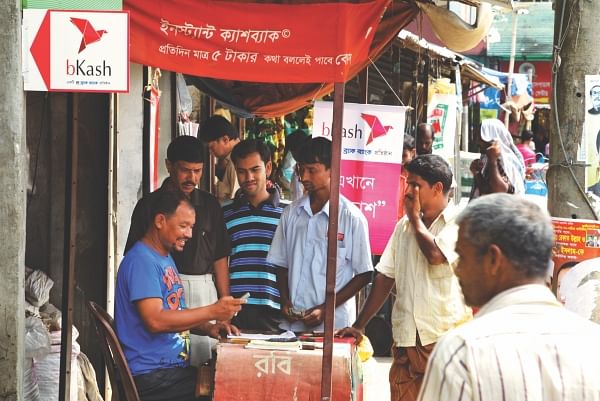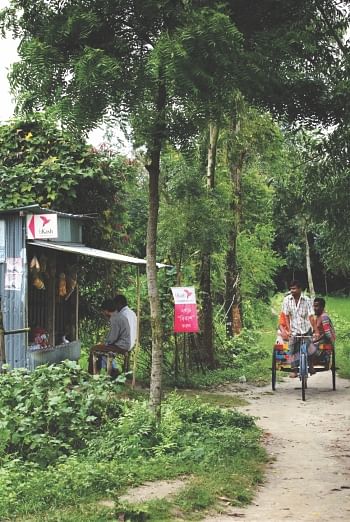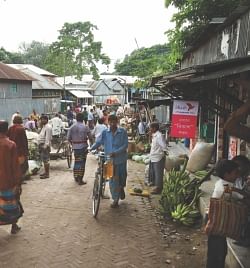| Home - Back Issues - The Team - Contact Us |
 |
| Volume 11 |Issue 40| October 12, 2012 | |
|
|
Special Feature
A Way Out for the Unbanked Naimul Karim
The phenomenon of mobile banking in Bangladesh has been gradually gaining popularity over the years. A glance at the telecom sector of some of the other third world countries, such as Kenya, Somalia or even Pakistan will provide a somewhat similar scenario. In general, m-banking tends to attract people in the low-income category, often from rural areas. The business thrives in areas where the majority of the population remain 'un-banked' or where there's a poor penetration of the banking sector. Weak infrastructure, widespread poverty and high dependency on agriculture have made Bangladesh an ideal region for m-banking. The business model involves a banking agent who takes care of the financial dealings on behalf of the mobile companies. The agent plays a very important role here since s/he is the only medium that connects people from the rural areas to the banking accounts. The service quality of an organisation, practicing m-banking, also depends on the agents. They are required to perform functions similar to that of a banker. For instance, they open accounts, provide cash services and are also in charge of the dealings between the customer and the bank. M-banking hit the markets in Bangladesh at a time when the new concept was gaining popularity around the globe. It was initially introduced by TRUST Bank in 2010. Dutch Bangla Bank Ltd (DBBL) and BRAC bank followed suit in 2011. As per a survey conducted by the Bangladesh Bank in July this year, DBBL mobile banking organisation has approximately 172,000 registered users. BRAC, with bKash, on the other hand, has registered close to 240,000 users. Statistics prove that the number of people using m-banking facilities has seen a vital increase in the last couple of months. A monthly report published by bKash, stated that the company has registered more than 800,000 users since its inception, 14 months ago. The Brac-based company, so far, has dominated the market. Speaking to the Star, Kamal Quadir, CEO of bKash, explains the complex network of activities that lie behind every transaction, “There are many players in this field. The customers, the agent, the recipient, the server, bKash and BRAC bank accounts, system level verifications, telecom partner networks… each play crucial roles in the process that allows the customer to make a simple and secure transaction in an instant." In order to open a bKash account, customers, at first need to visit a bKash agent. Their names are usually listed on the company's official website along with the regions that they are in charge of. The clients can then receive digital money in their accounts and then cash it through any of the assigned bKash agents. The 16,000 agents in the country represent the core strength of bKash, claims Quadir. "On average, there is one bKash agent for every four villages in the country," he says.
Quadir claims to have received plenty of help from various bodies, in his pursuit to build a proper structure for the business. "We needed the support of telecom entrepreneurs (Banglalink, Grameenphone and Robi) with local understanding… we needed a large scale distribution management and Brac helped us with that. We needed technology and VISA came up with an application which has the capacity to handle the kind of growth we are expecting," he explains. However, a mere structure wasn't going to be enough. Once the fundamental concept was ready, Quadir and co. still had to find a way to reach the grassroots. "It was important to come up with a simple phone-interface. We could have developed an application for smart phones, but then the service would be limited to only affluent customers and would defeat the purpose of reaching the 'un-banked'. We had to come up with a universally acceptable platform,” he said. Keeping all these factors in mind, bKash opted to go for the 'Unstructured Supplementary Services Data', a system that is commonly used when one checks his or her balance on the phone. “It allows everybody to access bKash by dialing *247#, regardless of the price or sophistication of the handset," explains Quadir. Today, a bKash user can send up to Tk 10,000 at one go and Tk 25,000 in a month. The limits have been prescribed by the Bangladesh Bank in order to minimise risks of money laundering and illegal fund transfers. Financial security has always been a concern in these kinds of businesses and in order to address the issue the company came up with a technology entitled 'bKash mobile wallet', an application based on the VISA platform, which ensures that the transactions between customers are encrypted with the help of a unique pin code. "In order to conduct a transaction or to check the account balance, a user can access the system only after entering his or her password. In case a customer wants to cash-out, there is a fee of 1.85 percent on the amount withdrawn. Agents automatically receive a commission from bKash every time they assist in cash-in or cash-out for customers," explains Quadir. The mechanism, to a certain extent, has also helped in contributing towards the nation's socio-economic development. "We find most of the 'cash-in areas' or the areas where people put in money are the commercial and industrial hubs. On the other side, cash-out regions are those which are far from the bustling commercial hubs, specifically the least developed parts of in the country." However, as it so often happens, every new technology finds it difficult to make inroads into the mainstream and m-banking faces a similar dilemma. Figures from the Bangladesh Bank's survey state that only 20 per cent of the registered customers regularly use their m-banking facilities. Quadir believes that people have an unfounded fear of new technology. "Some of them mistakenly perceive that one requires an advanced skill to use technology and we are working to overcome this perception gap through education." While it may be too early to comment on the effect that bKash can have in the rural areas, the fast-increasing number of users, however, reflects its growing popularity. Whether bKash will remain a tool to address payment and money transfer efficiently will depend upon its performance in the coming years. As mentioned before, apart from marketing their tool, they'll also have to make people accept a completely foreign technology. However, if it does live up to its expectations, the benefits could be endless. People can improvise and use the tool for whatever service they require. From setting up businesses in a remote village to providing electricity through solar panels, bKash can significantly reduce the hassles related to transactions and simplify tasks.
|
||||||||
Copyright
(R) thedailystar.net 2012 |


